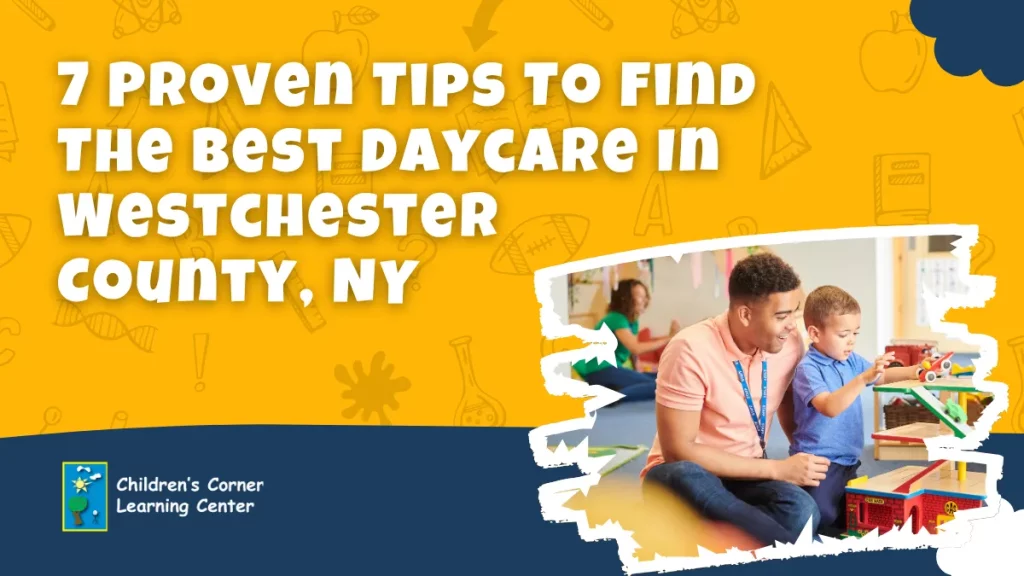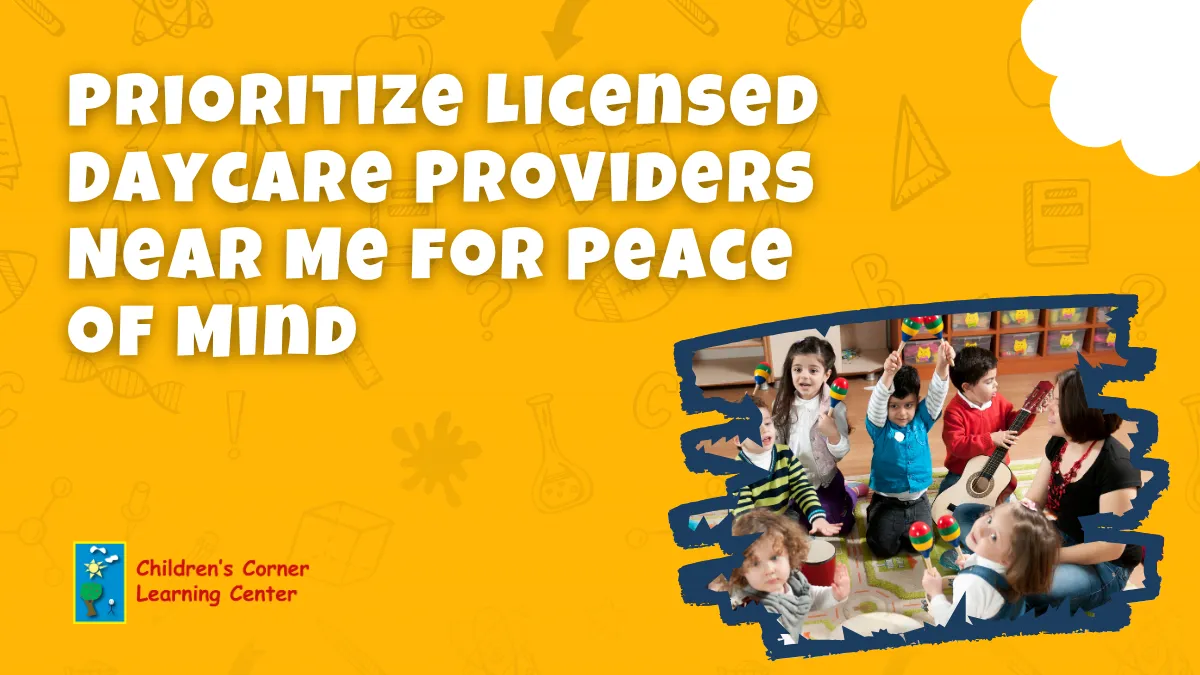Finding a reliable daycare in Westchester County NY, is a critical decision for families seeking a nurturing and educational environment for their children. With numerous options available, it is essential to identify a center that aligns with your child’s developmental needs and your family’s values. A high-quality daycare should provide a structured curriculum, a safe and stimulating setting, and experienced educators who foster early learning.
Parents are encouraged to evaluate a center’s philosophy, safety protocols, and reputation within the community. Whether looking for infant care, toddler programs, or pre-kindergarten preparation, understanding what to prioritize can simplify selection. The following tips will help you navigate the search and make a wise decision that supports your child’s growth and future success.
1. Understand How to Choose the Right Daycare for Your Child

Choosing the right daycare is a significant decision that can influence your child’s early development and well-being. A suitable program should provide a safe environment, a consistent routine, and meaningful learning opportunities. Understanding what to prioritize helps families make informed choices based on practical and developmental factors.
Start with Your Child’s Individual Needs
Each child has unique characteristics that affect how they adjust to new environments. It is important to consider personality, behavior, and developmental stage. The following aspects can guide your assessment:
- Emotional readiness: Some children adapt easily, while others may need gradual transitions
- Learning preferences: Hands-on learners may benefit from activity-based settings
- Social behaviors: Observe how your child interacts with peers or caregivers
- Routine compatibility: Sleep, meals, and activity patterns should align with your child’s habits
These insights will help identify environments where your child can thrive.
Examine Program Structure and Teaching Philosophy
A daycare should support both academic and social-emotional development. As you compare programs, look for the following elements:
- Balanced routines: Daily schedules should include structured and unstructured time
- Child-led exploration: Activities that allow freedom within boundaries
- Defined learning objectives: Focused goals for each developmental stage
- Age-specific methods: Materials and strategies tailored to age groups
A strong structure combined with flexibility encourages a well-rounded experience.
2. Research and Compare Childcare Centers in Westchester, NY
Once you identify your family’s priorities, the next step is thoroughly researching and comparing available childcare centers in Westchester, NY. A structured evaluation process helps ensure you select a center that meets both safety standards and developmental expectations.
Visit Facilities in Person
An on-site visit provides valuable insight into daily operations. It allows you to observe interactions, examine safety measures, and evaluate classroom environments. During visits, pay close attention to the following:
- Cleanliness and organization: Classrooms and common areas should be tidy and well-maintained
- Security procedures: Entry systems, visitor logs, and emergency plans should be clearly in place
- Classroom atmosphere: Look for positive staff-child interactions and age-appropriate activities
- Outdoor spaces: Safe, enclosed areas for physical activity and play are essential
These observations reveal how centers prioritize safety, structure, and engagement.
Compare Program Offerings and Schedules
Centers may differ in curriculum structure, daily routines, and enrichment opportunities. Understanding these distinctions is key to making a suitable choice. Evaluate the following:
- Daily structure: Consistent routines that support learning and transitions
- Enrichment programs: Opportunities such as music, art, or movement
- Meal and rest schedules: Aligned with your child’s habits
- Communication policies: Regular updates and access to staff
A comprehensive review allows families to choose a center that reflects educational quality and family needs.
3. Prioritize Licensed Daycare Providers Near Me for Peace of Mind

Selecting a licensed daycare provider ensures that the center meets established safety, staffing, and program quality standards. Licensing is critical when choosing a childcare center, as it reflects compliance with state regulations and regular oversight by governing bodies. Families gain peace of mind knowing that licensed providers follow clear operational guidelines.
Verify Licensing and Accreditation
Before enrolling, confirm that the provider is fully licensed and, if applicable, holds additional accreditations. These credentials demonstrate a devotion to quality care. Look for the following:
- State-issued license: Valid and current documentation on display
- Regulatory compliance: Adherence to health, safety, and staffing standards
- Third-party accreditations: Recognition from early childhood education organizations
- Clear disciplinary records: No history of unresolved violations or infractions
This verification process helps ensure accountability and consistency.
Assess Staff Credentials and Safety Policies
Licensed providers are required to meet strict hiring and training standards. This contributes to a secure and well-managed environment. Key factors include:
- Background checks: Thorough screening for all staff members
- Ongoing training: Regular professional development in early childhood care
- Health protocols: Up-to-date procedures for illness prevention and emergencies
- Supervision practices: Clear guidelines for classroom management and safety
Choosing a licensed daycare provider establishes a foundation of trust, professionalism, and child-focused care.
4. Evaluate Curriculum and Daily Schedules
A structured and developmentally appropriate curriculum is essential to supporting early learning. The daily schedule should balance academic instruction, social interaction, and physical activity. When evaluating a daycare program, consider how the curriculum aligns with educational goals and the natural rhythm of a child’s day.
Assess Curriculum Structure and Content
An effective program should promote growth across multiple domains, including cognitive, language, motor, and social skills. Look for these key elements:
- Defined learning objectives: Clear goals for each age group and stage
- Integrated subject areas: Activities that blend literacy, math, science, and the arts
- Adaptability: Flexibility to accommodate different learning styles and needs
- Assessment tools: Methods used to track developmental progress
These components reflect a commitment to purposeful and intentional instruction.
Review Daily Routines and Transitions
The daily schedule should be consistent yet flexible enough to meet the needs of young children. Smooth transitions and a variety of activities help maintain engagement. Observe whether the center offers:
- Balanced activity blocks: Time for structured lessons, free play, and rest
- Physical movement: Indoor and outdoor opportunities for gross motor development.
- Meal and hygiene breaks: Scheduled times that reinforce healthy habits.
- Group and individual time: Opportunities for collaboration and focused attention.
A well-organized day supports learning, reduces stress, and promotes overall well-being.
5. Consider Teacher-to-Child Ratios and Group Sizes
Teacher-to-child ratios and group sizes directly impact the quality of care and individual attention each child receives. Lower ratios allow caregivers to respond more effectively to developmental needs, ensure safety, and foster meaningful interactions. Reviewing these factors is essential when selecting a daycare program.
Understand State Guidelines and Best Practices
Licensed centers are required to follow specific regulations regarding staffing. However, high-quality programs often exceed these minimums. Pay attention to the following:
- Age-specific ratios: Infants typically require 1:3 or 1:4 ratios, while older children may have 1:8 or 1:10
- Group size limits: Smaller groups support individualized attention and reduce overstimulation
- Additional support staff: Floaters or aides help maintain coverage during breaks
- Compliance monitoring: Centers should regularly review staffing against requirements
These standards ensure that caregivers are not overextended and can maintain quality care.
Evaluate Impact on Daily Interactions
A well-balanced group setting contributes to a child’s emotional and social development. During visits, observe how staff engage with children in different scenarios:
- Prompt responses: Teachers address needs and questions quickly.
- Active supervision: Continuous awareness of all children in the room.
- Personal connections: Staff know children by name and understand their routines.
- Positive behavior support: Redirection and encouragement based on individual needs.
Smaller, well-managed groups allow for more intentional teaching and secure relationships.
6. Examine Communication Practices with Families
Consistent and transparent communication between families and daycare providers is essential to support a child’s development and maintain trust. A center that prioritizes open dialogue helps parents stay informed, engaged, and confident in their child’s care.
Evaluate Daily and Ongoing Communication Methods
Parents should receive regular updates on their child’s progress, routines, and any changes in behavior or health. Effective communication practices often include:
- Daily reports: Summaries of meals, naps, activities, and moods.
- Parent-teacher conferences: Scheduled meetings to discuss development and goals.
- Digital platforms: Apps or portals for real-time updates and photos.
- Bulletins and newsletters: Monthly or weekly information about curriculum and events.
These tools foster a strong connection between home and school environments.
Understand Policies for Feedback and Concerns
An open-door policy and willingness to address questions demonstrate professionalism and respect. Families should look for the following practices:
- Accessible leadership: Administrators are available to discuss concerns.
- Clear protocols: Defined steps for handling feedback or complaints.
- Respectful dialogue: Communication is handled with professionalism and courtesy.
- Consistent follow-up: Issues are resolved promptly with documented outcomes.
Centers prioritizing open communication provide children and families with a more supportive and collaborative experience.
Review Flexibility, Location, and Cost
While educational quality is critical, practical considerations such as flexibility, location, and cost also play a significant role in choosing a daycare. These factors influence the overall convenience and sustainability of the arrangement for your family.
Evaluate Proximity and Transportation
Location affects daily logistics and emergency accessibility. Families should take into account:
- Commute time: Close to home or work for efficient drop-off and pick-up.
- Transportation services: Bus or shuttle options are available if needed.
- Neighborhood safety: Secure surroundings with reliable infrastructure.
- Parking and access: Safe and convenient for daily transitions.
A well-located center enhances reliability and peace of mind.
Understand the Full Cost Structure
Transparent pricing helps families plan effectively. Look for:
- Tuition clarity: Detailed breakdowns of monthly or annual fees.
- Additional charges: Clear policies on meals, materials, and late fees.
- Payment options: Flexibility in billing cycles or financial assistance.
- Value alignment: Cost reflects the quality and breadth of services offered.
Considering these practical elements ensures the daycare arrangement is both effective and sustainable.
Finding the Right Daycare to Support Your Child's Growth
Finding the right daycare in Westchester County NY, is a meaningful step toward supporting your child’s growth, learning, and well-being. By following these seven proven tips, families can identify a center that offers a safe, nurturing environment and a foundation for lifelong development. With thoughtful planning and clear priorities, the process becomes more focused, allowing you to choose confidently and clearly.
Take the next step toward a supportive and enriching childcare experience.Book a tour today or call (800) 933 7757 to discover how Children’s Corner Learning Center can fit your family.










